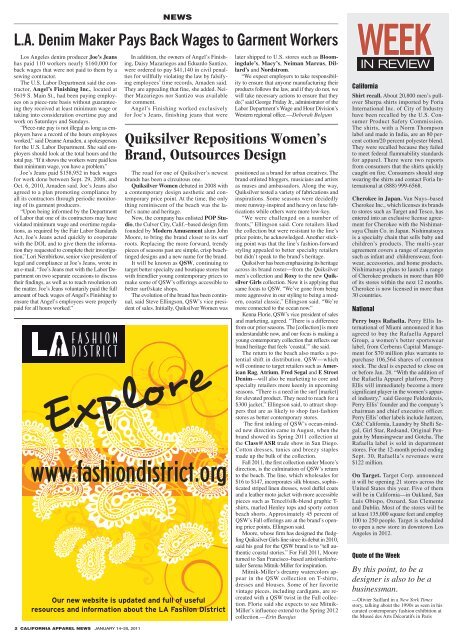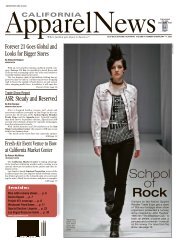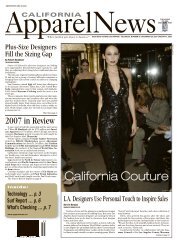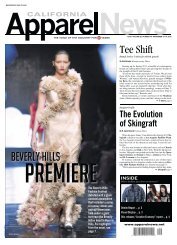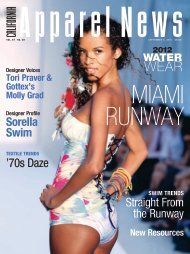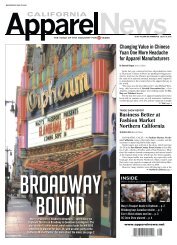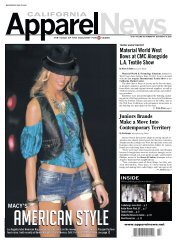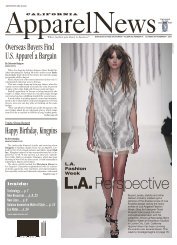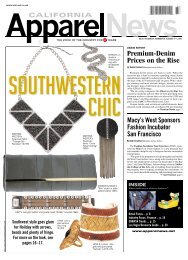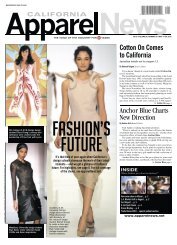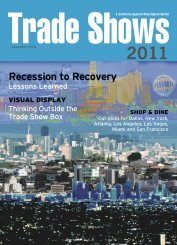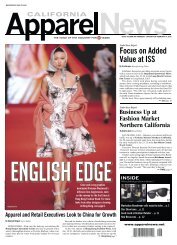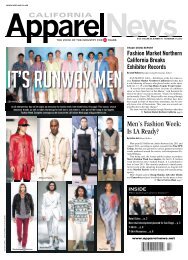Tribal - California Apparel News
Tribal - California Apparel News
Tribal - California Apparel News
You also want an ePaper? Increase the reach of your titles
YUMPU automatically turns print PDFs into web optimized ePapers that Google loves.
L.A. Denim Maker Pays Back Wages to Garment Workers<br />
Los Angeles denim producer Joe’s Jeans<br />
has paid 110 workers nearly $160,000 for<br />
back wages that were not paid to them by a<br />
sewing contractor.<br />
The U.S. Labor Department said the contractor,<br />
Angel’s Finishing Inc., located at<br />
5619 S. Main St., had been paying employees<br />
on a piece-rate basis without guaranteeing<br />
they received at least minimum wage or<br />
taking into consideration overtime pay and<br />
work on Saturdays and Sundays.<br />
“Piece-rate pay is not illegal as long as employers<br />
have a record of the hours employees<br />
worked,” said Deanne Amaden, a spokesperson<br />
for the U.S. Labor Department. She said employers<br />
should look at the total hours and the<br />
total pay. “If it shows the workers were paid less<br />
than minimum wage, you have a problem.”<br />
Joe’s Jeans paid $158,952 in back wages<br />
for work done between Sept. 29, 2008, and<br />
Oct. 6, 2010, Amaden said. Joe’s Jeans also<br />
agreed to a plan promoting compliance by<br />
all its contractors through periodic monitoring<br />
of its garment producers.<br />
“Upon being informed by the Department<br />
of Labor that one of its contractors may have<br />
violated minimum wage and overtime regulations,<br />
as required by the Fair Labor Standards<br />
Act, Joe’s Jeans acted quickly to cooperate<br />
with the DOL and to give them the information<br />
they requested to complete their investigation,”<br />
Lori Nembirkow, senior vice president of<br />
legal and compliance at Joe’s Jeans, wrote in<br />
an e-mail. “Joe’s Jeans met with the Labor Department<br />
on two separate occasions to discuss<br />
their findings, as well as to reach resolution on<br />
the matter. Joe’s Jeans voluntarily paid the full<br />
amount of back wages of Angel’s Finishing to<br />
ensure that Angel’s employees were properly<br />
paid for all hours worked.”<br />
FASHION<br />
DISTRICT<br />
2 CALIFORNIA APPAREL NEWS January 14–20, 2011<br />
NEWS<br />
In addition, the owners of Angel’s Finishing,<br />
Daisy Mazariegos and Eduardo Santizo,<br />
were ordered to pay $41,140 in civil penalties<br />
for willfully violating the law by falsifying<br />
employees’ time records, Amaden said.<br />
They are appealing that fine, she added. Neither<br />
Mazariegos nor Santizo was available<br />
for comment.<br />
Angel’s Finishing worked exclusively<br />
for Joe’s Jeans, finishing jeans that were<br />
later shipped to U.S. stores such as Bloomingdale’s,<br />
Macy’s, Neiman Marcus, Dillard’s<br />
and Nordstrom.<br />
“We expect employers to take responsibility<br />
to ensure that anyone manufacturing their<br />
products follows the law, and if they do not, we<br />
will take necessary actions to ensure that they<br />
do,” said George Friday Jr., administrator of the<br />
Labor Department’s Wage and Hour Division’s<br />
Western regional office.—Deborah Belgum<br />
Quiksilver Repositions Women’s<br />
Brand, Outsources Design<br />
The road for one of Quiksilver’s newest<br />
brands has been a circuitous one.<br />
Quiksilver Women debuted in 2008 with<br />
a contemporary design aesthetic and contemporary<br />
price point. At the time, the only<br />
thing reminiscent of the beach was the label’s<br />
name and heritage.<br />
Now, the company has enlisted POP Studio,<br />
the Culver City, Calif.–based design firm<br />
founded by Modern Amusement alum John<br />
Moore, to bring the brand closer to its surf<br />
roots. Replacing the more forward, trendy<br />
pieces of seasons past are simple, crisp beachtinged<br />
designs and a new name for the brand.<br />
It will be known as QSW, continuing to<br />
target better specialty and boutique stores but<br />
with friendlier young contemporary prices to<br />
make some of QSW’s offerings accessible to<br />
better surf/skate shops.<br />
The evolution of the brand has been continual,<br />
said Steve Ellingson, QSW’s vice president<br />
of sales. Initially, Quiksilver Women was<br />
Explore<br />
www.fashiondistrict.org<br />
Our new website is updated and full of useful<br />
resources and information about the LA Fashion District<br />
positioned as a brand for urban creatives. The<br />
brand enlisted bloggers, musicians and artists<br />
as muses and ambassadors. Along the way,<br />
Quiksilver tested a variety of fabrications and<br />
inspirations. Some seasons were decidedly<br />
more runway-inspired and heavy on luxe fabrications<br />
while others were more low-key.<br />
“We were challenged on a number of<br />
fronts,” Ellingson said. Core retailers liked<br />
the collection but were resistant to the line’s<br />
price points, he acknowledged. Another sticking<br />
point was that the line’s fashion-forward<br />
styling appealed to better specialty retailers<br />
but didn’t speak to the brand’s heritage.<br />
Quiksilver has been emphasizing its heritage<br />
across its brand roster—from the Quiksilver<br />
men’s collection and Roxy to the new Quiksilver<br />
Girls collection. Now it is applying that<br />
same focus to QSW. “We’ve gone from being<br />
more aggressive in our styling to being a modern,<br />
coastal classic,” Ellingson said. “We’re<br />
more connected to the ocean now.”<br />
Kenna Florie, QSW’s vice president of sales<br />
and marketing, agreed. “There is a difference<br />
from our prior seasons. The [collection] is more<br />
understandable now, and our focus is making a<br />
young contemporary collection that reflects our<br />
brand heritage that feels ‘coastal,’” she said.<br />
The return to the beach also marks a potential<br />
shift in distribution. QSW—which<br />
will continue to target retailers such as American<br />
Rag, Atrium, Fred Segal and E Street<br />
Denim—will also be marketing to core and<br />
specialty retailers more keenly in upcoming<br />
seasons. “There is a need in the surf [market]<br />
for elevated product. They need to reach for a<br />
$300 jacket,” Ellingson said, to attract shoppers<br />
that are as likely to shop fast-fashion<br />
stores as better contemporary stores.<br />
The first inkling of QSW’s ocean-minded<br />
new direction came in August, when the<br />
brand showed its Spring 2011 collection at<br />
the Class@ASR trade show in San Diego.<br />
Cotton dresses, tunics and breezy staples<br />
made up the bulk of the collection.<br />
Fall 2011, the first collection under Moore’s<br />
direction, is the culmination of QSW’s return<br />
to the beach. The line, which wholesales for<br />
$16 to $147, incorporates silk blouses, sophisticated<br />
striped linen dresses, wool duffel coats<br />
and a leather moto jacket with more accessible<br />
pieces such as Tencel/silk-blend graphic Tshirts,<br />
marled Henley tops and sporty cotton<br />
beach shorts. Approximately 45 percent of<br />
QSW’s Fall offerings are at the brand’s opening<br />
price points, Ellingson said.<br />
Moore, whose firm has designed the fledgling<br />
Quiksilver Girls line since its debut in 2010,<br />
said his goal for the QSW brand is to “tell authentic<br />
coastal stories.” For Fall 2011, Moore<br />
turned to San Francisco–based artist/surfer/retailer<br />
Serena Mitnik-Miller for inspiration.<br />
Mitnik-Miller’s dreamy watercolors appear<br />
in the QSW collection on T-shirts,<br />
dresses and blouses. Some of her favorite<br />
vintage pieces, including cardigans, are recreated<br />
with a QSW twist in the Fall collection.<br />
Florie said she expects to see Mitnik-<br />
Miller’s influence extend to the Spring 2012<br />
collection.—Erin Barajas<br />
Week<br />
In RevIew<br />
<strong>California</strong><br />
Shirt recall. About 20,800 men’s pullover<br />
Sherpa shirts imported by Foria<br />
International Inc. of City of Industry<br />
have been recalled by the U.S. Consumer<br />
Product Safety Commission.<br />
The shirts, with a Norm Thompson<br />
label and made in India, are an 80 percent<br />
cotton/20 percent polyester blend.<br />
They were recalled because they failed<br />
to meet federal flammability standards<br />
for apparel. There were two reports<br />
from consumers that the shirts quickly<br />
caught on fire. Consumers should stop<br />
wearing the shirts and contact Foria International<br />
at (888) 999-6568.<br />
Cherokee in Japan. Van Nuys–based<br />
Cherokee Inc., which licenses its brands<br />
to stores such as Target and Tesco, has<br />
entered into an exclusive license agreement<br />
for Cherokee with the Nishimatsuya<br />
Chain Co. in Japan. Nishimatsuya<br />
is a specialty chain that sells baby and<br />
children’s products. The multi-year<br />
agreement covers a range of categories<br />
such as infant and childrenswear, footwear,<br />
accessories, and home products.<br />
Nishimatsuya plans to launch a range<br />
of Cherokee products in more than 800<br />
of its stores within the next 12 months.<br />
Cherokee is now licensed in more than<br />
30 countries.<br />
National<br />
Perry buys Rafaella. Perry Ellis International<br />
of Miami announced it has<br />
agreed to buy the Rafaella <strong>Apparel</strong><br />
Group, a women’s better sportswear<br />
label, from Cerberus Capital Management<br />
for $70 million plus warrants to<br />
purchase 106,564 shares of common<br />
stock. The deal is expected to close on<br />
or before Jan. 28. “With the addition of<br />
the Rafaella <strong>Apparel</strong> platform, Perry<br />
Ellis will immediately become a more<br />
significant player in the women’s apparel<br />
industry,” said George Feldenkreis,<br />
Perry Ellis’ founder and the company’s<br />
chairman and chief executive officer.<br />
Perry Ellis’ other labels include Jantzen,<br />
C&C <strong>California</strong>, Laundry by Shelli Segal,<br />
Girl Star, Redsand, Original Penguin<br />
by Munsingwear and Gotcha. The<br />
Rafaella label is sold in department<br />
stores. For the 12-month period ending<br />
Sept. 30, Rafaella’s revenues were<br />
$122 million.<br />
On Target. Target Corp. announced<br />
it will be opening 21 stores across the<br />
United States this year. Five of them<br />
will be in <strong>California</strong>—in Oakland, San<br />
Luis Obispo, Oxnard, San Clemente<br />
and Dublin. Most of the stores will be<br />
at least 135,000 square feet and employ<br />
100 to 250 people. Target is scheduled<br />
to open a new store in downtown Los<br />
Angeles in 2012.<br />
Quote of the Week<br />
By this point, to be a<br />
designer is also to be a<br />
businessman.<br />
—Olivier Saillard in a New York Times<br />
story, talking about the 1990s as seen in his<br />
curated contemporary fashion exhibition at<br />
the Museé des Arts Décoratifs in Paris


